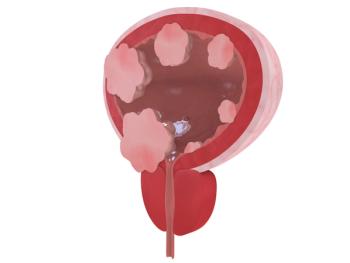
The phase 2 AMEERA-3 trial revealed no progression-free survival benefit of amcenestrant vs physician’s choice of endocrine monotherapy in patients with endocrine-resistant, estrogen receptor–positive, HER2-negative advanced breast cancer.

Your AI-Trained Oncology Knowledge Connection!


The phase 2 AMEERA-3 trial revealed no progression-free survival benefit of amcenestrant vs physician’s choice of endocrine monotherapy in patients with endocrine-resistant, estrogen receptor–positive, HER2-negative advanced breast cancer.

The phase 3 JAVELIN Lung did not produce statistically significant overall or progression-free survival benefit with avelumab for non–small cell lung cancer.

Results from cohort C of the phase 2 VISION trial showed continued efficacy when tepotinib was given to patients with non–small cell lung cancer harboring MET exon 14 skipping alterations.

Data from the phase 2 UCLA/TRIO-US L-07 trial presented at 2022 WCLC revealed that efficacy with talazoparib plus temozolomide improves upon historical controls in patients with extensive-stage small cell lung cancer.

In patients with colorectal cancer and synchronous unresectable metastases, resection of the primary tumor before systemic therapy did not result in an extension of overall survival.

Without regard for tumor histology, NRG1-positive cancers treated with zenocutuzumab experienced promising efficacy and acceptable safety.

Patients with EGFR exon 20 insertion–positive non–small cell lung cancer may have antitumor response with the selective EGFR inhibitor CLN-081 following multiple prior lines of treatment.

Acceptable efficacy and safety were elicited in patients with advanced solid tumors and high tumor mutational burden detectable in both blood and tissue samples with nivolumab/ipilimumab therapy.

Phase 3 SOROYA trial revealed promising response rates with mirvetuximab soravtansine in patients with platinum-resistant ovarian cancer and high folate receptor–alpha expression.

Adding olaparib to durvalumab did not significantly improve progression-free survival for patients with previously untreated, platinum-ineligible metastatic urothelial carcinoma.

Patients with resectable microsatellite instable/mismatch repair–deficient oeso-gastric junction adenocarcinoma experienced a high rate of pathologic complete response following treatment with neoadjuvant nivolumab and ipilimumab followed by adjuvant nivolumab.

Preclinical evidence supports further research in combining a menin inhibitor plus targeted therapies, as this may result in superior efficacy for patients with KMT2A-rearranged and NPM1-mutated acute myeloid leukemia.

Deep responses were seen with single infusion ciltacabtagene autoleucel for heavily pretreated patients with multiple myeloma who were refractory to lenalidomide.

Maintenance oral azacitidine produced a sustained survival benefit over placebo for patients with acute myeloid leukemia in first remission.

Tolerable safety and durable remissions seen with ublituximab and umbralisib plus ibrutinib for patients with chronic lymphocytic leukemia who had detectable minimal residual disease after previous ibrutinib therapy.

Mosunetuzumab given to patients with heavily pretreated patients with relapsed or refractory follicular lymphoma demonstrated an effective response.

Zanidatamab and single agent chemotherapy may hold promise in a population of patients with previously treated HER2-positive breast cancer.

Treatment with induction UGN-101 produced durable responses in patients with low-grade upper tract urothelial carcinoma.

The CALGB prognostic risk group and subsequent life-prolonging therapies could potentially impact overall survival in patients with metastatic castration-resistant prostate cancer who are receiving lutetium 177.

Final read-out of progression-free survival data from the ALTA-1L trial indicates significant benefit of brigatinib versus crizotinib for patients with ALK-positive non–small cell lung cancer who have not previously received an ALK inhibitor.

Patients with low-grade upper tract urothelial carcinoma achieved a long period of durable response after undergoing treatment with UGN-101.

Patients with early-stage non–small cell lung cancer experienced a survival benefit with adjuvant atezolizumab vs best supportive care.

Patients with cervical cancer receiving pembrolizumab plus chemotherapy with or without bevacizumab in the frontline setting had improvement in overall survival, potentially representing a new standard of care regimen.

Patients with previously untreated metastatic or unresectable melanoma achieved promising benefit following treatment with relatlimab/nivolumab combination therapy.

Adjuvant atezolizumab led to disease-free survival benefit in patients with early-stage non–small cell lung cancer, including most patient subgroups, in the phase 3 IMpower010 trial.

A population of patients with relapsed/refractory multiple myeloma who received elranatamab with or without lenalidomide experienced encouraging responses despite being heavily pretreated.

In a trial of patients with chronic lymphocytic leukemia, small lymphocytic lymphoma, and other hematologic cancers, the BCL-2 inhibitor lisaftoclax demonstrated feasibility as a treated option in the relapsed or refractory setting.

All patients with chronic lymphocytic leukemia who were treated with zanubrutinib in the relapsed/refractory setting showed impressive responses.

Adding panitumumab to 5-FU and leucovorin significantly improved PFS compared with 5-FU/leucovorin alone as a maintenance therapy for patients with RAS wild-type metastatic CRC.

Patients with metastatic TNBC treated with sacituzumab govitecan maintained an efficacy benefit compared with physician's choice chemotherapy.